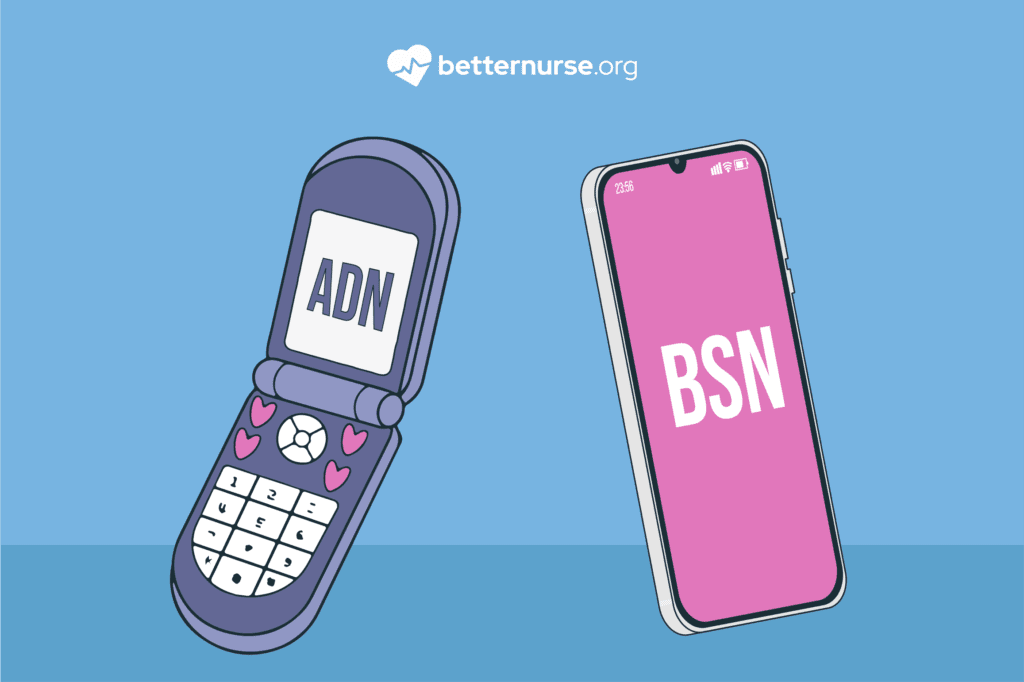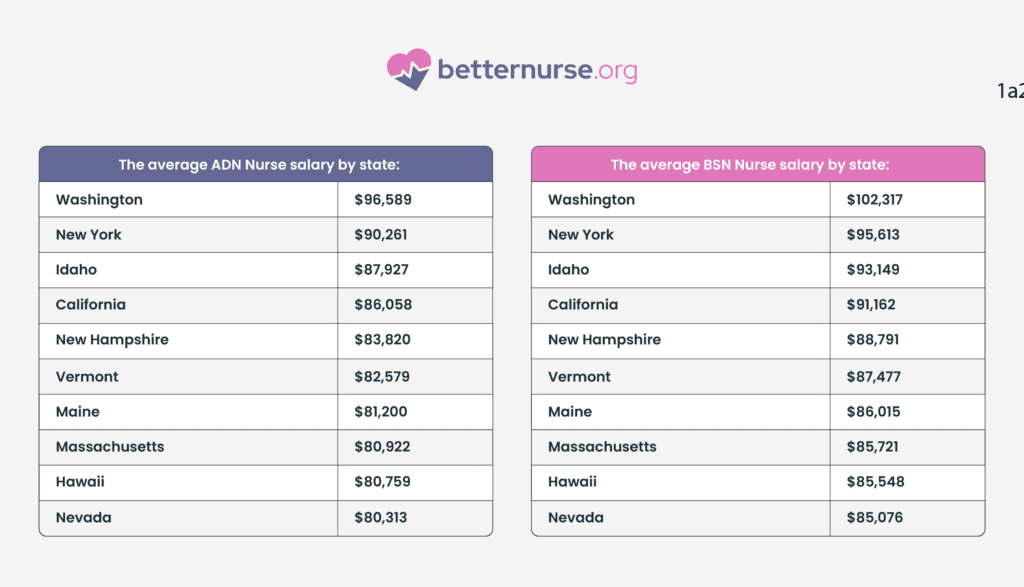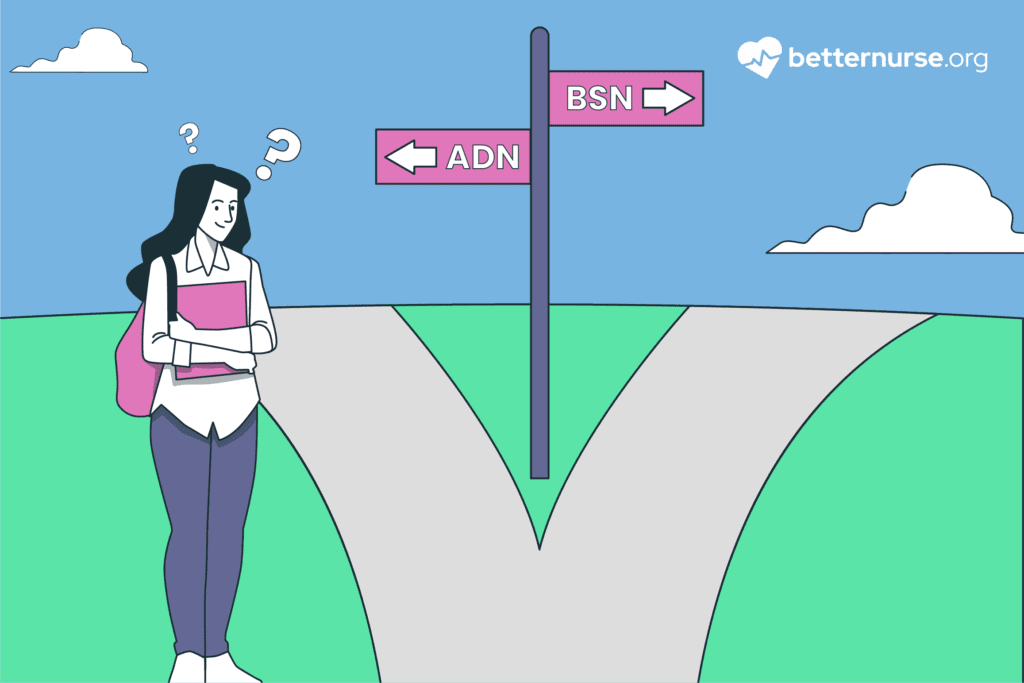ADN (Associate Degree in Nursing) and BSN (Bachelor of Science in Nursing) are two educational pathways for registered nurses (RNs)—ADN nursing is a two-year program, and BSN is a four-year program.
ADN and BSN nursing programs are two different educational paths that aspiring RNs can take. The primary difference between the two is the length of time and the depth of knowledge they offer. While one might have more job opportunities and earn higher salaries than the other, both can provide quality patient care.
Table of contents
Takeaway

Comparing ADN and BSN nursing programs is like comparing a basic phone to a high-end smartphone with advanced features. Both devices allow you to make calls and send messages, but the high-end smartphone offers many more options and a more versatile user experience.
The ADN program is like the basic phone—it provides you with the essential skills and knowledge to become a registered nurse, and you can complete the program in a relatively short period, usually 2 to 3 years.
The BSN program is like the high-end smartphone with advanced features—it covers the same foundation as the ADN but adds more in-depth knowledge, skills, and leadership training, leading to more comprehensive nursing education. The BSN typically takes four years to complete.
While both ADN and BSN nurses can work as RNs, the BSN-prepared nurse may have more opportunities for career advancement, specialized roles, and higher salaries, just as a high-end smartphone offers more features, better performance, and a more sophisticated user experience compared to a basic phone.
What Is an ADN?
As previously mentioned, ADN stands for Associate Degree in Nursing. This degree program generally takes about two years to complete and equips students with the necessary skills and knowledge to become registered nurses.
ADN programs concentrate on fundamental nursing concepts, such as patient care, human anatomy, pharmacology, and nursing ethics. Upon completing an ADN program, graduates are eligible to take the National Council Licensure Examination (NCLEX-RN) to obtain their RN licensure.
As a more cost-effective alternative, ADN programs often present a more accessible entry point into the nursing profession compared to traditional 4-year university nursing programs.
What Is a BSN?
A BSN, or Bachelor of Science in Nursing, is a four-year undergraduate degree program that provides students with the skills, knowledge, and practical experience necessary for a successful career in nursing.
The program covers a wide range of topics, including nursing theory, patient care, research, ethics, and leadership. BSN graduates are equipped to work in various healthcare settings and may have more opportunities for career advancement, as well as access to specialized nursing roles and management positions. The BSN degree is often required or preferred by employers for higher-level nursing positions.
ADN vs. BSN: What Are the Main Differences?
Nursing education offers two paths to becoming an RN: the ADN and BSN pathway. While both can lead to the same profession, there are some critical differences that you need to know before choosing the path that is right for you. So, let’s dive into the main differences between ADN and BSN programs and help you make an informed decision about your future career in nursing.
Education
The main difference between ADN and BSN programs is the level of education required. An ADN is typically a two-year program offered by community colleges or technical schools. A BSN, on the other hand, is a four-year program offered by universities and colleges.
During an ADN program, students learn the essential skills and knowledge required for future nurses, such as patient care, pharmacology, and nursing fundamentals. ADN programs typically include clinical experiences in hospitals, long-term care facilities, and other healthcare settings.
Curriculum
ADN: The curriculum for an ADN program focuses primarily on technical nursing skills, providing a foundation in clinical practice, nursing theory, and patient care. The courses mainly cover subjects such as anatomy, physiology, pharmacology, and nursing fundamentals.
BSN: The curriculum for a BSN program encompasses a broader range of nursing topics, including leadership, research, public health, and management. In addition to the core nursing courses found in ADN programs, BSN programs also emphasize critical thinking, evidence-based practice, and effective communication. They often include liberal arts and sciences courses as well.
NCLEX pass rates
The NCLEX is a licensing exam that all aspiring RNs must pass to practice in the United States. BSN programs generally have higher NCLEX pass rates than ADN programs. However, this can vary depending on the specific nursing programs and the resources provided to students.
When choosing a nursing program, it is important to research the NCLEX pass rates for that particular institution to gauge the quality of education and the success of its graduates. You can typically find this information on a school’s website or by contacting their nursing department.
Keep in mind that while NCLEX pass rates can be an indicator of a program’s quality, they should not be the sole factor in your decision-making process. Other factors, such as the program’s curriculum, faculty, clinical experiences, and support resources, should also be considered when selecting a nursing program.
Career opportunities
Without a doubt, BSN graduates have an edge when it comes to career advancement. BSN programs prepare graduates for a broader range of roles and responsibilities within healthcare, including management positions, research, and teaching. Additionally, many healthcare facilities prefer to hire BSN-prepared nurses for management and leadership positions and specialized areas like critical care or oncology.
Patient safety
BSN programs strongly emphasize evidence-based practice and research, which can help BSN graduates provide safer and more effective care to their patients. By incorporating the latest research and evidence-based practices into their work, BSN-prepared nurses can help improve patient outcomes and reduce the risk of medical errors.
Salary and job outlook
While both BSN and ADN degrees can lead to a career as an RN, BSN-prepared nurses generally earn higher salaries and have more job opportunities and advancement potential. However, both career paths are in high demand and offer promising job outlooks for the future.
Below you can find a list of the top 10 states with the highest average salaries for both ADN and BSN nurses, according to recent data. These figures can be a helpful reference point for anyone considering a nursing career or those already working in the field looking to relocate.

How Do You Decide Between an ADN vs. a BSN?

Choosing between an ADN and a BSN can be difficult, but ultimately it depends on your career goals and personal preferences. If you want a shorter, more affordable option, an ADN program may be the right choice. On the other hand, a BSN degree may be a better fit if you want to pursue leadership roles or specialize in a particular area of nursing.
No matter your chosen path, you will positively impact people’s lives daily. Remember that nursing is constantly evolving, with many professional growth and development opportunities, regardless of which degree you pursue.
Ultimately, the most important thing when choosing between these two options is selecting a program that aligns with your goals and values and will help you become the best nurse you can be.
The Bottom Line
In this article, we have explored the key differences between ADN and BSN nursing programs, including the length of the program, the depth of the curriculum, and the career opportunities each degree provides.
Both ADN and BSN programs offer unique benefits and can lead to rewarding careers in nursing. The choice between these two paths ultimately depends on your personal goals, career aspirations, and the amount of time and resources you are willing to invest in your education.
As a next step, we encourage you to research and compare nursing programs in your area, paying particular attention to factors such as curriculum, faculty, clinical experiences, and NCLEX pass rates. To get started, you can visit the websites of local colleges and universities or contact their nursing departments to request information.
Remember that the nursing profession is both challenging and rewarding, and the decision to pursue a career in this field should not be taken lightly. Whether you choose an ADN or BSN program, embarking on this journey requires dedication, hard work, and a passion for helping others.

Nurse Luke is a CRNA who specializes in Nursing content and still enjoys a very busy career with Locum, Per Diem and Travel nursing in the greater midwest. He has over 25 years of experience in the healthcare field and received his CRNA masters degree from the Mayo Clinic School of Healthcare. He is passionate about helping nurses explore the options of becoming a travel nurse as well as spending time with his Family.



